Student research provides momentum for discovery, professional growth
Author: Stacey Maifeld
Author: Stacey Maifeld
A powerhouse of undergraduate student research, the College of Liberal Arts and Sciences (LAS) expands student opportunities by funding a select group of student researchers each fall, spring, and summer.
Since 2018, the LAS Dean’s High Impact Awards for Undergraduate Research have awarded over $500,000 to students who conduct important research alongside faculty mentors. Supported by generous alumni donations, the awards help students gain experience for their future careers and prepare successful applications to graduate school and professional programs. The awards can also give students the financial freedom to choose research over a part-time job.
Learn what a few of the fall 2022 award recipients are discovering about their fields, the research process, and themselves.
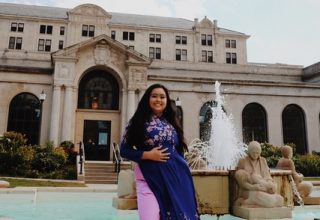
Kristina Ly (’23 biology) admits that the coolest part of her research may seem a little squeamish to some. She is fascinated by dissecting drosophila larvae.
“It’s very intriguing how their different organs work together to form a larva to a full-grown adult fly,” she said. “With such small brains they have, it’s crazy to find out how impactful it is when it comes to their fast development.”
Ly, a recipient of multiple LAS undergraduate research awards, is studying the developmental growth of the JIL-1 Z2 drosophila fly.
“The project is to see if JIL-1 Z2 drosophila flies have lower expression of PTTH hormones in the PG neurons of the brain,” she said, “which could be the cause to lower ecdysone levels leading to developmental delay in these specific flies.”
Ly works with Hyelee Loyd, a research scientist in the Roy J. Carver Department of Biochemistry, Biophysics, and Molecular Biology. Ly said Loyd’s mentorship has been important in helping her grow, explore, and ask more questions as a researcher.
“She is such a supportive person when it comes to me academically and during my personal growth,” Ly said. “I genuinely look up to her and cannot thank her enough for pushing me to my fullest potential.”
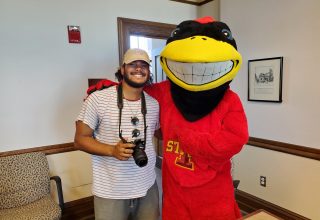
The Carrie Chapman Catt Center for Women and Politics, the Department of Political Science, and the Student Innovation Center have partnered on a year-long innovation “sprint,” called Go Vote 2.0, to engage more students in the election process. The sprint is the extension of a similar effort last year, termed a four-week innovation “dash.”
A group of undergraduate political science students are leading this year’s effort. Three of those students – Demarquis Heard (’23 political science), Alyssa Rodriguez (’23 political science), and Lauren Rush (’23 political science) – earned 2022 LAS High Impact Awards for Undergraduate Research to come up with innovative ways to get more students involved with the 2022 midterm election.
Heard is working to understand why students who study science, technology, engineering, and mathematics (STEM) have lower voter turnout.
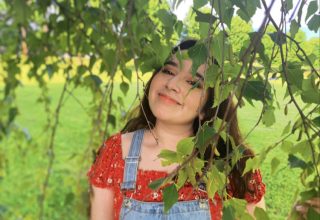
“STEM students and science-minded individuals across the county participate in elections at much lower rates than their peers, so my project has been focusing on why that is and how to remedy the issue,” Heard said.
Rodriguez is engaging with underrepresented groups and discovering innovative ways to get them to participate in political elections.
“I’m researching different barriers that underrepresented groups face in voting, and trying to determine what solutions Iowa State can implement,” Rodriguez said. “Our goal is to increase student voter participation in the midterm election across all communities.”
Rush is reaching out to students in residence halls and the Greek community to entice them to vote.

“I am working to increase political participation and civic engagement on the Iowa State campus,” Rush said. “I’m specifically focused on working with students in residence halls and the fraternity and sorority community on campus to increase their political involvement.”
Talking with a variety of students across campus has given Heard, Rodriguez, and Rush new insight on how people view democracy and the election process.
“Coming from political science, I obviously have my own perceptions of what civic engagement means to me, but studying how students view civic engagement has been an eye-opening experience,” Heard said.
Abigail Krull (’24 genetics) conducts research in Iowa State’s zebrafish lab, where she deletes a specific gene in zebrafish embryos using CRISPR-Cas9 – a genome-editing technology – and then confirms that the deletion was successful using biochemical analysis techniques. This work could translate into life-altering gene-therapy treatments for both humans and animals.
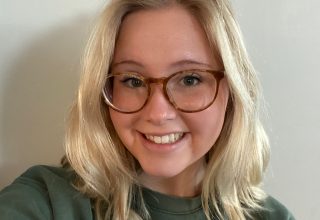
“With the research I am doing right now, we hope to implement gene editing for personalized medicine purposes,” Krull said. “Any work with an organism involving CRISPR-Cas9 will help us gain the knowledge to push these treatments ahead.”
Krull understands that, as an undergraduate researcher, she isn’t expected to have all the answers. Her faculty mentor, Jeff Essner, professor of genetics, development, and cell biology, reassures her that making mistakes is part of the learning process.
“One thing that my faculty mentor Jeff Essner always reiterates is that research is a trial-and-error process, and that failure is going to be normal,” Krull said. “It is learning from those mistakes that is important.”
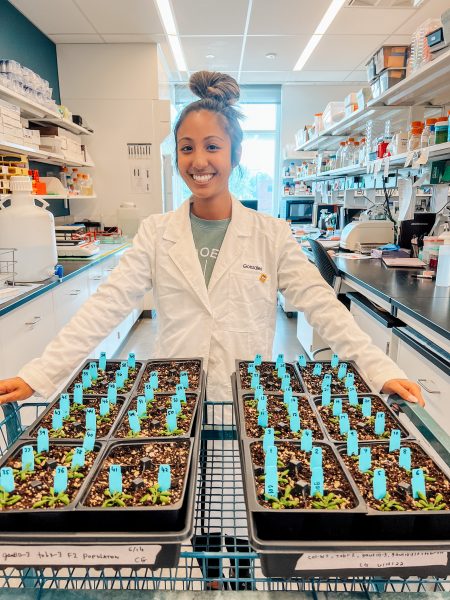
As an undergraduate researcher in the Kelley Lab on campus, Caitlin Gonzales (’23 genetics) is looking for ways to make the roots of the Arabidopsis plant longer and stronger.
“My role in the research project is linking GAUT10 function to root cell composition in auxin, which is a major plant hormone that plays a bunch of roles in plant biology,” Gonzales said. “I use two different genes to see if I can make the cell walls and short roots of the plant grow longer.”
Developing ways to strengthen and lengthen the roots of plants could help researchers develop new methods for growing nutrient-rich, durable crops.
“We’re trying to find a way that we can make these plants live longer,” Gonzales said. “Some people say mutations are bad, but it could be beneficial to figure out a plant’s cell walls and development.”
Gonzales is grateful to the College of Liberal Arts and Sciences for giving her the opportunity to hone her research skills in the Kelley Lab.
“I’m very thankful to be in LAS and for LAS to offer me the LAS Dean’s High Impact Award,” Gonzales said. “I think it’s amazing that LAS actually funds you for doing your research because a lot of research opportunities or internships don’t pay you as an undergrad, so that is really amazing.”